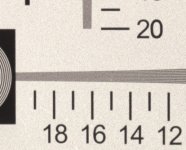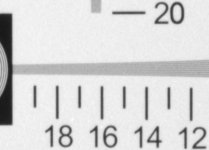trog
f/stop!
It's a wet-grey Canada day. No better time to spend some quality time with my photo hobby.
I use both a Nikon CS 8000ED and an Epson V750 for my scans. The Epson is reserved for my 4x5 stock, where the Nikon (c/w 120- glass film holder) is my workhorse for 120 and 35mm. In an effort optimise my Epson flat bed scans; I've been experimenting with various film holders. I'm currently working with the BetterScanning.com variable height film holder, coupled with a DIY mask I fabricated from 18-gauge 304 Stainless Steel.
I usually scan 4x5 stock for large print formats (44" x 60"). With the Eposn scanner setting cranked up to 4800DPI and Multiple-Scan turned ON, scans can take up to 2-hours. Over that time, I found that the adhesive tape holding the film on the B/S glass would fail and the film would separate and sag onto the scanner glass resulting in only half an in-focus image.
The steel mask I fabricated allows me to mount the film on top, which I then sandwich with a piece of AN glass. I can both wet and dry mount using this approach. The film is maintained flat, and there's no tape required. Results to date have been pretty good, but there's still room for improvement.
The Nikon 8000ED specs are considerably better than the Epson. However out of curiosity, I wanted to see how they compared. Below you'll find a couple of test-patterns comparing the two scanners. I use Nikon SCAN on the ED8000 and Silverfast 8 on the Epson.
The first image is the Nikon set at 4000DPI, the second is the Epson at 4800DPI.
I use both a Nikon CS 8000ED and an Epson V750 for my scans. The Epson is reserved for my 4x5 stock, where the Nikon (c/w 120- glass film holder) is my workhorse for 120 and 35mm. In an effort optimise my Epson flat bed scans; I've been experimenting with various film holders. I'm currently working with the BetterScanning.com variable height film holder, coupled with a DIY mask I fabricated from 18-gauge 304 Stainless Steel.
I usually scan 4x5 stock for large print formats (44" x 60"). With the Eposn scanner setting cranked up to 4800DPI and Multiple-Scan turned ON, scans can take up to 2-hours. Over that time, I found that the adhesive tape holding the film on the B/S glass would fail and the film would separate and sag onto the scanner glass resulting in only half an in-focus image.
The steel mask I fabricated allows me to mount the film on top, which I then sandwich with a piece of AN glass. I can both wet and dry mount using this approach. The film is maintained flat, and there's no tape required. Results to date have been pretty good, but there's still room for improvement.
The Nikon 8000ED specs are considerably better than the Epson. However out of curiosity, I wanted to see how they compared. Below you'll find a couple of test-patterns comparing the two scanners. I use Nikon SCAN on the ED8000 and Silverfast 8 on the Epson.
The first image is the Nikon set at 4000DPI, the second is the Epson at 4800DPI.



